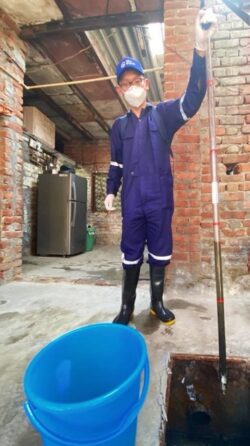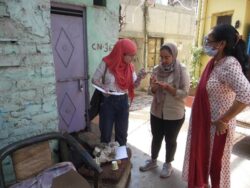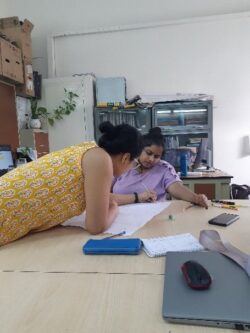Different perspectives: stories of water and sanitation research in India
By Carolina Montoya Pachongo (postdoctoral researcher), Hannah Jayne Robinson (WaterWISER PhD researcher), Bushra Hasan (WaterWISER PhD researcher), and Zhe Zhan (WaterWISER PhD researcher). Please contact Zhe Zhan, Bushra Hasan, Hannah Jayne Robinson, or Carolina Montoya Pachongo if you are interested in any of these research studies.
India is a country with millennia of outstanding culture and heritage, with 28 states and eight union territories, 121 officially recognised languages (according to the 2011 census), and five distinct biomes (forest, grassland, tundra, desert and aquatic). During a series of recent research visits, our Leeds team have experienced Indian warmth, kindness, and generosity every day of their work.
In recent decades, India has invested billions of rupees into water and sanitation infrastructure, with the recent Swachh Bharat Mission (2014-2019) aiming to eliminate open defecation by the end of the period. According to official government reports this has been achieved, with estimates of 100 million toilets being built, yet independent organisations estimate 91 million people still do not have access to potable water in India, and only 46 percent of the population has access to safely manged household sanitation.
Climate change is posing additional challenges to the water security conditions in India: dry and warm seasons are lasting longer, and monsoon seasons are becoming more intense. Flooding and heat waves are becoming more common as a result. For example, in May 2020, a news media covered reports from the Indian meteorological officials saying Churu in the northern state of Rajasthan was the hottest place on record at 50 °C, while parts of Punjab, Haryana and Uttar Pradesh states sweltered in the high 40s. Parts of Delhi reported 47.6 °C. On the 14th of May 2022, the temperature in Delhi reached a maximum value of 51.8 °C, attracting the attention of the news media once more.

To contribute to water security, a group of four researchers from the School of Civil Engineering at the University of Leeds has been working in India on water security risks, sanitation, and gender policy implementation in the WASH sector (water, sanitation, and hygiene). These topics are intertwined, and the entire investigation provides an opportunity to highlight various research perspectives in India’s WASH sector. These researchers have been working there since 2021 and have visited several locations across the country at different times. Research partners from the School of Planning and Architecture (SPA) and the Indian Institute of Technology Delhi, both in New Delhi, have been supporting this research. This research is part of the international project Water Security and Sustainable Development Hub and the WaterWISER Centre Doctoral Training.
In terms of flooding and onsite sanitation, the PhD student Zhe Zhan is working to identify the effects of flooding on toilet performance and to assess the health impact of flooded sanitation facilities.
Zhe Zhan conducted fieldwork activities in the Delhi suburb of Jaitpur in March and April 2023. These activities included sludge sampling and toilet measurements; interviews with local community members about the user behaviour and experience of toilets during monsoon and non-monsoon seasons; and laboratory testing of the sludge properties, such as settling velocity, viscosity, density, and E. coli concentrations.
Jaitpur village is one of the many informal settlements in Delhi that has grown rapidly despite being on the bank of the Yamuna River, which is a flood-prone area. Most residents of Jaitpur village are migrants from northern states, and it is estimated that approximately 98 percent of the households rely on sealed tanks or septic tanks for sanitary disposal. Based on the vulnerability of tanks under flooding conditions, it is reasonable to expect that local households will face worsening faecal contamination because of flooding events caused by climate change. As a result, understanding the precise mechanisms of human faeces transmission from the onsite sanitation infrastructure is critical for charting a course of action.

Bushra Hasan, a third-year PhD student, is investigating the implications of community toilets in the transmission risk of respiratory infections within informal settlements in Delhi. She is doing so by studying how the design of community toilets and toilet usage patterns and behaviours of users affect exposure risk to respiratory pathogens.
Bushra did fieldwork activities in the Anna Nagar informal settlement. This settlement is in East Delhi between a railway track and a stream that drains into the Yamuna River. There are approximately 3,000 households within the settlement, with families living in overcrowded, low-resourced, and poor conditions. Most of the households do not have access to a private toilet (or domestic water supply), so families must rely upon the available community toilets and communal water taps to meet their needs. These shared facilities are frequently unhygienic and left unmaintained, resulting in intermittent water supply and contamination.
As sharing of WASH facilities is a significant component of the lived experience of this community (and many similar communities in Delhi), it is important to understand how using a shared toilet facility can pose a health risk, especially in times of respiratory disease outbreaks, such as during the COVID-19 pandemic, when social distancing was mandatory, or even during seasonal influenza.
This work contributes to a broader understanding of the implications of community toilets on human public health.

Hannah Jayne Robinson is looking at gender implementation in WASH, with a focus on national sanitation programmes. Research across the Delhi, Hyderabad, Jaipur, and Chennai focused on how gender has been portrayed, designed for, and ultimately implemented in the Swachh Bharat Missions.
India has a population of over 1.4 billion inhabitants, and has a rich history of gender identities beyond cisgender men and women, but no reliable or up-to-date information exists regarding people who identify outside this standard binary; those who are transgender, Hijra or have other culturally defined gender identities.
Hannah’s recent work involved interviews and focus groups with transgender and hijra activists and members of the Ministry of Social Justice and Empowerment (where transgender rights are situated). The emphasis on marginalised communities stems from the lack of prioritisation of this legally recognised gender. She intends to highlight the disparity by documenting their current access, needs, and future ideal facilities.
Hannah’s research will provide much needed evidence into how ‘gender’ is incorporated at national and local levels in WASH, and how there is often gaps between policy and reality.

Carolina’s general research is focuses on how to develop a tool for river basin stakeholders to analyse water-security risks through participatory research. She designed the MUISKA (MUltidimensional rISK Analysis) approach for this, which she will validate in the municipality of Cajibío, Colombia.
To assist other research partners in the potential application of this approach in their specific contexts, Carolina collaborated with Shilpa Sharma from SPA on the understanding and adaptation of MUISKA to the Barapullah basin. First, they conducted an inventory of the information currently available at the India Collaboratory. As a result, they decided that the flood hazard would be the best subject to apply MUISKA to. By mapping the interrelations among water security hazards and their consequences and the distribution of such consequences across dimensions and scales, Carolina and Shilpa identified data gaps to assess the flood risk at this basin. Senior researchers will make the final decision on how to apply MUISKA to the Barapullah basin.

As an example of result integration, Zhe’s findings on the effects of flood events on faecal contamination spreading could help to SPA colleagues working on the flood risk assessment using the MUISKA approach.
This research, conducted by members of the School of Civil Engineering at the University of Leeds, demonstrates the benefits of collaborating with international partners to better understand the problems and challenges faced by vulnerable communities, as well as how researchers, practitioners, and decision makers can improve their practises to provide sustainable solutions to the affected people and ecosystems. In the end, we hope to contribute to improved health and wellbeing conditions in the areas where we do research.
Please contact Zhe Zhan, Bushra Hasan, Hannah Jayne Robinson, or Carolina Montoya Pachongo if you are interested in any of these research studies.
Follow us on our Twitter (@LeedsUniCivil) and share this information with co-workers, colleagues, relatives, and friends.
